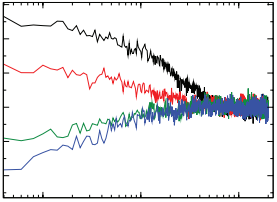Abstract
At temperatures moderately below their glass transition temperature, the properties of many glass-forming materials can evolve slowly with time in a process known as physical aging whereby the thermodynamic, mechanical, and dynamic properties all drift towards their equilibrium values. In this work, we study the evolution of the thermodynamic and dynamic properties during physical aging for a model polymer glass. Specifically, we test the relationship between an estimate of the size of the cooperative rearrangements taking the form of strings and the effective structural relaxation time predicted by the Adam-Gibbs relationship for both an equilibrium supercooled liquid and the same fluid undergoing physical aging towards equilibrium after a series of temperature jumps. We find that there is apparently a close correlation between a structural feature of the fluid, the size of the string-like rearrangements, and the structural relaxation time, although the relationship for the aging fluid appears to be distinct from that of the fluid at equilibrium.
